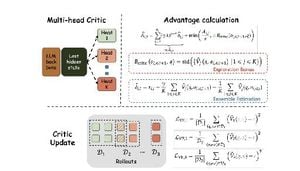When most people think of strength training, they might picture young athletes pumping iron or bodybuilders lifting heavy weights. But one personal trainer, Lauren Hurst, is reshaping this stereotype by focusing her work on older adults, proving it's never too late to strengthen one's body and improve quality of life. Hurst, who trains clients ranging from their 50s to their 90s, emphasizes the importance of strength training as we age. According to her, it helps maintain strength and mobility and can significantly improve life expectancy.
"Strength training is key for aging healthfully," Hurst explained. Her insights come at a time when more Americans are living longer — average life expectancy for U.S. adults increased from 76.4 years in 2021 to 77.5 years by 2022. With these extra years, many people want to live not just longer but healthier lives.
Aging can often come with the natural decline of muscle mass, which begins subtly as early as our 30s and 40s. This decline can hinder daily activities we may take for granted, like getting up from a chair or climbing stairs. Hurst likens strength training to giving people their functional independence back. She believes building muscle is integral to not just enhancing longevity but improving one’s quality of life overall.
A study published in the British Journal of Sports Medicine backs Hurst's assertions. It found participants who combined 150 to 300 minutes of cardio weekly with weight training once or twice also exhibited lower mortality rates, being 41% less likely to die for any reason compared to less active individuals. This staggering statistic reinforces the significance of incorporating strength training alongside aerobic activity for healthy aging.
For those just beginning their strength training journeys, Hurst has some practical tips. First and foremost, she stresses the importance of using proper form when lifting weights to avoid injuries. Working with skilled trainers or coaches who can guide beginners is highly encouraged. Learning the right techniques ensures the exercises are effective and safe.
Another important point Hurst makes is the need to select weights heavy enough to provoke muscle growth. Many beginners might underestimate the weight suitable for them. "You don't need to be Superman, but if you're using weights that's almost zero, it won't yield results," she advised, echoing sentiments from other experts on the value of resistance training.
Luke Worthington, another personal trainer, affirms this notion, recommending doing 12 to 15 reps per exercise for optimal muscle building. This feedback reinforces Hurst's advice, urging clients to challenge themselves adequately during workouts.
To create well-rounded exercise sessions, Hurst suggests focusing on all major muscle groups. Strategies like full-body workouts or split routines help to not only build strength effectively, but also allow specific muscles to recover between sessions, preventing overuse injuries.
By centering her training methods around movement fundamentals needed for daily activities, Hurst empowers her older clientele. Her philosophy relates strength training to real-life necessities, making the exercises more relevant and motivating. Her oldest client currently is 98 years old. Yes, you read it right, 98! This client embodies Hurst's approach to aging actively.
Hurst's emphasis is not merely to lift weights but to mold resilience and empowerment through physical strength — no matter what age. Strength training opens doors to autonomy and independence, making daily tasks much easier. Above all, her clients report improved functional health and self-esteem after including strength training routines.
To summarize, strength training isn't just for the young and fit; it's truly for everyone, especially as we age. Lauren Hurst is transforming perceptions around fitness, showing how older adults can — and should — embrace strength training as part of their wellness routines.
For anyone considering embarking on their fitness journeys or reigniting their workout regimes, the message is clear: prioritize strength training for longevity and improved health. Just like Hurst's diverse clientele, fitness can be inclusive and rewarding. So why not give it a shot?



